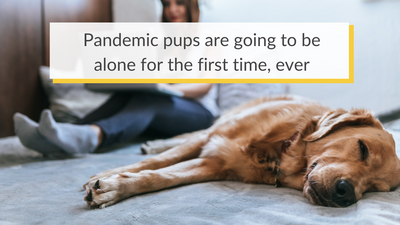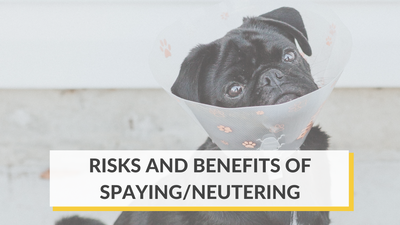There's nothing like the feeling of welcoming a puppy into your heart and home. Puppies love to give kisses, cuddle, play and be silly. But they can also be a little devilish sometimes as they test their boundaries and explore their surroundings. As a puppy parent, you're probably wondering how to teach your furbaby to behave, and you might not know when they're ready to learn.
We're here to help your bundle of fur grow into a healthy, happy pup. We'll look at what puppies should know at different stages of development and what you can expect of your pup along the way. Raising a puppy is an adventure and might seem tricky at times, but with some knowledge and patience, you'll get the hang of it quick. You'll also have plenty of time to set parenting aside and give your furbaby lots of belly rubs.
The Stages of Puppy Development
Puppies are not considered adults until they complete their development, which can take one or two years. Puppies grow the most within their first year, but, just like people, they will continue to learn new things beyond that.

When puppies are newborns, they are blind, deaf and unable to walk. Imagine your furbaby as a tiny toothless ball — they are still completely dependent on their dog mom. Once their eyes open and they take their first steps, they are just about ready for their new parents and home. At about 8 to 12 weeks, furbabies are ready to leave the nest and start the puppy life.
Here are the different stages you need to know as a pawrent, and everything you can expect with puppy development. Whatever you do, don't stress it. Puppies mostly need meals, playtime, a few potty trips throughout the day and lots of sleep. Congratulations on your new furbaby — you can do this!

What Should a Puppy Know at Two Months?
If you're wondering what your puppy should know at 10 weeks or about two months, do not expect much. Young pups are bursting with curiosity and energy, but they have a lot to learn. This is the age that puppies start to learn right from wrong and how to interact socially through biting, chewing, chasing and running.
This is the best time to start training and socializing your puppy, and you don't want to wait until your puppy is older. Puppies in this age range learn new things quickly and are eager to please. Make sure they meet friends and family and have lots of new experiences. Remember, it takes times for behaviors to solidify in a puppy's mind, so patience and consistency are key.
At this age, puppies are still very young and do not always know what they are allowed to chew on or when they should ask to go out. You'll need to spend a lot of time with your new pup, and plan to puppy-proof your home to keep your furbaby safe from household cleaning chemicals and other dangers. If you leave the baby pup alone, they might experience separation anxiety or go on a chewing frenzy. Do not leave a young pup home alone for long, or at all if possible.
You can start teaching basic obedience commands at this age, and you can teach them to walk on a leash. Don't yell or punish your pup because they are especially sensitive to loud noises and trauma at this age. Also, have fun playing games like tug of war and fetch. Games are fun opportunities to teach your furbaby to drop toys while getting exercise and playtime with mom or dad.

Lastly, introduce your pup to older dogs and cats when you bring them home. This is a good time for your furbaby to learn to respect other animals. However, make sure to protect your puppy because an older dog might play too rough or become annoyed with puppy tactics. In general, here's what to focus on teaching your young pup:
- How to behave with friends, family and other animals
- Not to bite hard
- How to take food gently
- Walking on a leash
- Basic commands like "sit" and "stay"
What Should a Puppy Know at Four Months?
By four months, you'll notice your furbaby growing fast. Also, most puppies are potty-trained by this time. However, they still might have accidents if they are left to hold it too long. Puppies can also start to learn more complex commands at this age if they are ready.
It is normal for puppies to go through a fear phase at around 14 to 16 weeks of age. During this stage of development, they are extra cautious around new people and places, and it's a normal part of adapting to different environments. Avoid potentially traumatic or overwhelming experiences during this stage, and be sensitive to your furbaby's needs.
While around other pups, the puppy will establish where they fit in during this age range. Their social behavior will vary depending on experiences they had when they were younger. Puppies who are well-socialized and enjoy meeting new people have outgoing personalities. However, if puppies are not given the right outlets to release their energy, they might become destructive.
Make sure your furbaby gets adequate exercise and has plenty of stimulating toys. If a puppy is afraid of people or places, do not force them into new situations but gradually introduce them to new environments.

Puppies will lose most of their baby teeth by this age and adult teeth will grow in. They can also be neutered or spayed between the ages of four to six months, though many vets recommend spaying or neutering between five and nine months. Here are a few tips to keep in mind with a 4-month-old pup:
- Get teething toys
- Prevent traumatic experiences
- Work on behavioral issues
- Expose your pup to grooming
- Consider advancing to complex commands
What Should a Puppy Know at Six Months?
If your pup is six months old, they've entered their adolescent phase. Your puppy will be finished growing mostly by six to 12 months, but still might gain muscle and weight. Your pup will have most of their permanent teeth, and they will also lose their baby fur and grow their adult coat.
Although your furbaby is growing up fast, have no fear — 6-month-old pups have tons of youthful spunk and still need training. Also, like teens, they might show a touch of attitude. Expect boy pups to make urine marks, and girl pups might go into heat. High levels of hormones might cause puppies to display aggressive behavior at this age, and males might fight for dominance.
At six months and beyond you can advance your puppy's training and teach them new skills even with distractions around. For example, you might teach them to sit or stay for a longer period while you walk around or while other dogs play nearby. Advanced training is done step by step and by adding distractions in bits at a time. This is a good time to fill in areas you may have missed with training or to fix bad habits they carried from babyhood.
Adolescent pups might be more prone to boredom and could chew on furniture or shoes to keep busy. Make sure they exercise and engage in stimulating activities. Also remember they are still pretty much babies, and therefore still need plenty of rest. With a six-month-old pup, make it a goal to:
- Travel with your furbaby
- Get them used to brushing as they shed a lot of hair
- Start formal training
- Screen for health issues such as hip dysplasia
- Consider advanced obedience training
- Spay or neuter if you haven't done so
- Teach impulse control to prevent biting
When Does a Puppy Learn Its Name?
Puppies respond to sound and do not understand the meaning of a name. So if you decide to name your furbaby Rumpelstiltskin, you might want to reconsider because it could be a tough name for a pup to learn. Ideal puppy names are no longer than two syllables.

You can expect your puppy to learn their name quickly if you speak to them and use their name often. Here are a few tips for teaching your puppy their name:
- Get their attention: First, say your puppy's name in a happy, friendly tone. If they look at you, immediately reward them with praise or a treat. If they do not give you their attention, try again but clap your hands while you call their name. Do this when your puppy is not tired, and there are no distractions around.
- Lose their attention and repeat: Give your puppy the chance to turn away and call their name again. When they respond, reward them with a treat and praise.
- Repeat a few more times: Repeat the above steps eight to 10 more times in a few minutes and then give it a rest. Continue this training every couple of hours for the next few days, adding distractions and changing locations. Also, increase the time between calling their name and giving a reward. Before you know it, your puppy will know their name.
When Should a Puppy Be Housebroken?
Housebreaking can begin at eight weeks, but some experts recommend housebreaking between 12 and 16 weeks because puppies in this age range have better control and can hold it longer. If your puppy is older when you bring them home you'll have to work a little harder at changing their behavior, but it's not impossible — it might just take more time.
Depending on the puppy and the breed, housebreaking typically takes 4 to 6 months but may take up to a year. Some breeds, like smaller breeds with tinier bladders, for example, need to go out more often.
If your puppy still has accidents during training, don't worry — your furbaby will eventually learn with patience, consistency and encouragement. Don't punish the puppy if they go inside the house because they might learn to practice bad habits when you are not home. Tips for housebreaking include:
- Keep a regular feeding schedule and take away food between meals.
- Take your puppy out first thing in the morning and then once every 30 minutes to an hour.
- Always take the puppy out after meals or naps and before bed or being left alone.
- Take the pup to the same spot each time because their scent will encourage them to go.
- Stay with your puppy outside until they are trained, and give them time to explore and find a comfortable spot if necessary.
- When the puppy goes to the bathroom outside, reward them with praise, a treat or a nice walk.
If your puppy whines, starts sniffing the floor, barks or scratches at the door, take them out right away because those are all signs they need to go potty. When your baby pup has an accident, do not punish them and stick to training instead. If training does not work, take your pup for a medical evaluation to rule out any underlying health issues.
If you happen to catch your puppy in the act of making a doody in the house, clap loudly and take them outside immediately. Praise your furbaby when they are done outside.
What Commands Should a Puppy Know?
Just like human babies, puppies are a blank slate. They need to first learn the basics before they can advance to more complex commands. Puppies can begin training as soon as you bring them home. They can learn simple commands such as "sit" and "stay" as early as eight weeks. However, keep in mind that puppy attention spans are short, so it might be tough to teach them more difficult commands until they get a bit older.
Make training brief and regular. Try to train your pup for 15 minutes every day in five minutes sessions, and use treats to reward your puppy. Make it fun for you both and try not to push too hard.
Here are a few basic commands you can start teaching right away. Your puppy will let you know when they are ready to move on to more advanced training:
- Watch me: The watch me command helps your puppy learn future tricks. Hold a treat and move your hand from your puppy's nose to your face. Keep eye contact and say, "Watch me." Repeat several times a day every day until they get it. Once they learn, avoid using the treat as a distraction and instead only give the treat as a reward.
- Sit: Put the treat by your puppy's nose and then move it up, so they follow the treat in a position that makes them tilt their head. Once they look up, give the command to sit. Once they sit, reward them with the treat and praise. Repeat until they learn.
- Stay: Teach the "stay" command once your puppy learns to sit. After they sit, put the treat close to their nose and say, "Stay," then take a few steps away. If your furbaby stays and waits, give them the treat. If not, say, "No," and walk a few more steps away. Start over and repeat.
- Come: Put a leash and collar on your pup and ask them to come towards you by pulling a little on the leash. Reward them when they come towards you. Repeat several times a day.
Buy Furbo Dog Camera Today
Just like babies, puppies need extra care and attention. They have a lot to learn during important stages of development. Furbo Dog Camera is a helping hand throughout the process and also captures priceless moments so you can cherish your furbaby's monumental steps forever.
With Furbo, you can keep a close eye on your furbaby when you leave the house or when you're in another room. Dispense treats with the touch of your smartphone to keep training consistent, even when you're miles away. If your puppy has a bout of separation anxiety and is missing mom or dad, use Furbo to soothe them with your voice and release calming treats to help them relax until you return.
For all newbie pawrents, Furbo is a must-have. Your furbaby will thank you for being there for them, even when you aren't home, and you'll capture all the special moments you never want to miss — including when furbaby decides to chew up the sofa. Furbo allows you to see where your furbaby needs behavior improvement, so you can guide them down the path to becoming a strong, secure and well-behaved pup. Shop for Furbo Dog Camera today and welcome your new baby home with confidence!












